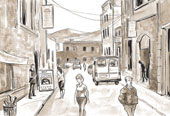 |
The small towns of England, writes the English local history chronicler Guy Parsloe, are much like her men ? ?they do not yield up their secret thoughts easily to any chance acquaintance?. But what if the subject of this chance acquaintance happens to be an immense disaster? How would England?s townsfolk regard this metaphorical stranger in their midst? As a foreign intruder in their season of merrymaking? Or a welcome object of charity at a time of giving?
Parsloe?s excellent 1932 book, The English Country Town, makes no attempt to pose such questions. But we found it hard to shake the question off as we wandered through towns and villages in the county of Somerset ?along the edges of one of England?s most spectacular forest reserves, Exmoor ? in the aftermath of the Asian tsunami disaster.
We had reached our wet and secluded holiday farm the day after the tsunami wreaked havoc in the Indian Ocean ? and every evening, with the grim resolve of ritual mourners, we gathered around the television set to digest the latest news and death toll. It was a mockery of death tolls ? climbing ever higher with every bulletin until they ceased to make sense. With entire towns wiped out, reporting the enormity of the tragedy appeared to be beyond the limits of televisual technology.
Predictably, anchors clung to numbers. And then the numbers became too large to handle.
No, it wasn?t the brightest start to our Christmas break in what after all is a beautiful and well-preserved part of England, full of rolling hills, rills, shy wild ponies and cosy country pubs offering warm country ale and venison pie. Here the rich went on deer and fox hunts ? there is a strong pro-hunt lobby in this primarily agricultural county, three of whose five MPs are from the Tory Party.
It was a world far removed from tsunami horrors. Or so I thought ? until I noticed a collection box in a tea room in a pretty little town right out of Parsloe?s book. And a local paper ? the Western Morning News from the neighbouring county of Devon ? whose December 29 edition spoke of a ?Westcountry family tragedy? caught up in the waves while holidaying in Thailand. I was wrong ? in the era of the global traveller no disaster is too far away. The point was driven home once again in the town of Dunster, known as the gateway to the Exmoor, where an English woman ? stranger to us but familiar with India ? asked us at length about the disaster and then informed us she would be our ?guide for the day?.
?Dunster, a parish, market, and post town. . . ? is how the National Gazetteer of 1868 describes the medieval town that is home to an immaculately maintained 15th-century church and, apparently, England?s oldest lemon tree. The care with which St George?s church is looked after ? by local women volunteers ? does not come as a surprise in Somerset. Some say the county is the birthplace of Christianity in Britain, although historians are cautious about claims of it being the site of Britain?s first monastery (in the town of Glastonbury).
Neither was the outpouring of public donations a surprise. As ordinary Britons raised ?70 million within days of the disaster, the government was shamed into increasing its pledge from half a million pounds to ?50 million.
But as with the 1984 Ethiopian famine, television news showed little of how the locals themselves were coping, of their heroism. Instead, the focus was ? is ? on aid; on who has pledged how much and whether or not it?s all going to end up lining the pockets of some corrupt intermediary. All of a sudden, amidst all the generosity, it seems we are back in the days of the helpless Third World.
On the question of who ?among Britons that is ? is giving how much, the government?s Social Attitudes Survey throws some interesting sidelights. Non-Christians, it says, are far more likely to donate money to charities than Christians. One in three non-Christians donates money, as opposed to one in eight Christians. And those who earn less than ?20,000 per year give much more than those who earn between ?20,000 and ?56,000 a year. In fact, people living in low-income housing, so-called council accommodation, are the most generous.
AIDS, tuberculosis and diarrhoea may kill more but there?s nothing like a tsunami to focus all of our minds on poverty. Even in Somerset.
Just as the ocean had played havoc with the Asian land mass, so all around us our spiritual boundaries seemed to tumble in the wake of the tsunami.
But would Somerset?s flock agree with the Archbishop of Canterbury that the tsunami should make Christians question the existence of God? ?The question, ?How can you believe in a God who permits suffering on this scale?? is... very much around at the moment, and it would be surprising if it weren?t ? indeed it would be wrong if it weren?t,? said Archbishop Rowan Williams.
St George?s church in Dunster, just before we left for London, was bathed in the soft glow of a clear English winter?s day, as was the charming high street, with its medieval Yarn Market. Inside, our host (?my friends in India call me Jo-Aunty,? she said) pointed to the church?s majestic wooden rood screen that she said was perhaps the longest in Europe. Although the sun was mild, it had lit up the stained glass windows. Jo spoke about her faith ? and her respect for all faiths.
Jo?s faith made sense ? at that moment, everything seemed to be in its place in Parsloe?s old English town.










